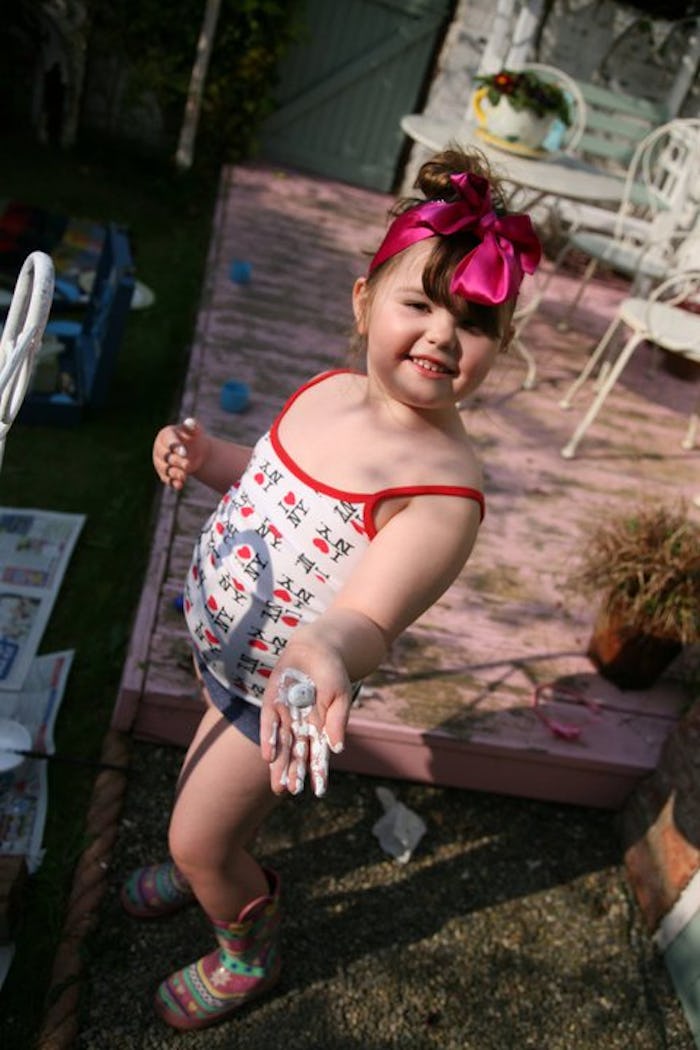Life

7 Subtle Ways Your Daughter Is Being Told To Question Her Body
Women are bombarded with propaganda about how they should look. Advertisements promote perfection and suggest that the average female is an unfinished project. Publications provide "tips" on how to cover “problem areas”, implying the female form is flawed. These messages aren’t just aimed at grown women, little girls are targeted too. Look closely, and there are plenty of subtle ways your daughter is being told to question her body.
Good self image , can be easily encouraged with body positive terms. The bigger challenge however, can be identifying the more subtle body shaming messages. Body ideals are found in so many products that are aimed at children. Unrealistic, and often dangerous, notions of how females should look and behave, are delivered in a surprising amount of ways. These limiting views can start to shape how girls feel about themselves, creating terrible pressures from an early age.
Since having my own daughter, I have been surprised by some of the underhand ways, that she is told how she looks is not good enough. Little girls are spoon fed a recipe for female beauty, and it’s a toxic brew. Here are seven examples of subtle body shaming that your daughter may face every day without realizing it.
1Buying Dolls With Unrealistic Bodies
Dolls can be a cause of concern for anyone trying to parent in a body positive way. These plastic figures are meant to be a representation of the female form, and when put in a child’s hand's they promote a totally unattainable body shape.
2Implying Girls Can't Be Pretty And Smart
From Scooby Doo’s Velma, to Amy in The Big Bang Theory, brains and beauty don't seem to go hand-in-hand on TV. Even Harry Potter’s Hermione (who my daughter worships) was only noticed fully by Ron at the Yule ball. Despite being the most accomplished witch, it was a nice dress and the attention of a male rival, that finally made Ron truly value her.These characters suggest that girls must choose between pretty or smart. And since the "pretty" girls attract more friends on TV, girls may feel the need to choose that option.
3Equating Beauty With Goodness
It TV and movies, it seems that the pretty girl gets the guy, the grades, the job, the friends, and the animals to weave her the perfect dress. It’s little wonder, then, that girls place such a high value on appearance.
4Insinuating Appearance Is The Only Commodity
As soon as someone sees a little girl, the compliments come pouring in. and they are often in the form of words like “pretty” and “adorable.” This immediately plants the idea that a girl’s appearance is one of her main commodities. Yes, I tell my daughter she is cute, but I also praise her for being clever, kind, and strong.
5Reading Magazines That Lack Diversity
My daughter subscribes to a number of magazines, but these seemingly harmless publications are full of girls who all look the same. White, pretty, and slim. So not only is she learning all about her favorite singers and YouTube stars, but she is also indirectly being schooled in how everyone should look. And that's not OK.
6Implying That Body Hair Is Unnatural
Girls will rarely, if ever, see a picture of a woman sporting body hair. Even kickass characters, like Katniss in the Hunger Games, still seem to find time for some underarm Bic action. I don't think shaving my legs makes me a bad feminist, but I always impress on my daughter that female body hair is totally normal.
7Twerking Your Way To Poor Body Image
Kid's love music videos, but the view of what it is to be a woman, in most of them, is incredibly narrow. Little girls aren’t critical thinkers, so won’t necessarily see the power in a gyrating popstar, but will instead just focus on the perfection of the body, being presented.
How do we combat these subtle messages? Encourage girls to question the messages they receive daily. Talk about women who achieve goals and greatness without depending on their appearance. Heap praise on them and others, for non image related successes, and keep reminding them that they have absolutely no obligation, to look a certain way.
Let’s raise happy, healthy girls, who are more concerned with pay gaps than thigh gaps.